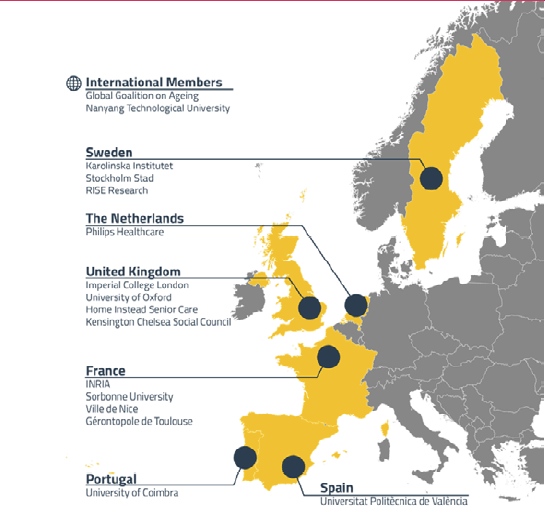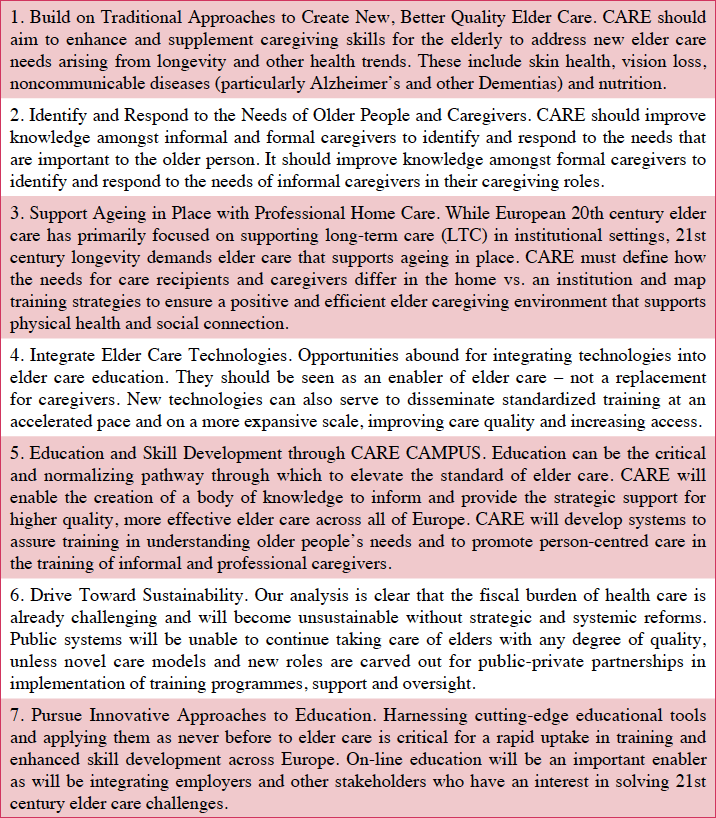MELEK SOMAI1, LEFKOS MIDDLETON1
1. Neuro-Epidemiology and Ageing Research, School of Public Health, Imperial College London.
Corresponding to: Melek Somai, Imperial College London, Charing Cross Hospital, St Dunstan’s Road, London, W6 8RP, m.somai@imperial.ac.uk
Care Weekly 2018;2:54-56
Published online November 5, 2018, http://dx.doi.org/10.14283/cw.2018.13
Introduction
By the end of this year, CARE Campus will celebrate its third year since its inception. Initially, a one year funded project for scoping the challenges and opportunities in supporting informal and formal caregivers in Europe, CARE Campus has grown into a fully operational consortium active in several European countries and leveraging the capabilities of a dozen academic, public, and private institutions. This growth of CARE Campus in the last months exemplifies the importance of formal and informal caregiving in supporting Healthcare aims to improve the health of the population, decrease cost, and improve the patient experience.(1) In this paper, we share our perspective and experience establishing CARE Campus as an innovative approach to tackle one of the biggest challenge facing the European healthcare system: the growing demand of healthcare services due to an Ageing population. We describe its journey and outline its future direction.
CARE Campus
Mission
Caring and Ageing Reimagined for Europe (CARE Campus) is a research and innovation project funded by the European Institute of Innovation and Technology in Health (EIT Health). which is an initiative of the European commission under the European Institute of Innovation and Technology (EIT). Unique in its design and philosophy (2), the EIT has been set up by the European Union as a hub to engage the European community in innovative large-scale projects.
CARE Campus focuses on one of the least recognized workforces in healthcare: the informal and formal caregivers. CARE Campus core mission is to increase the resilience of the healthcare system by improving the integration and knowledge of formal and informal caregivers at scale in Europe and across the globe. Currently, formal and more specifically informal caregivers are the “hidden” healthcare workforce. Whilst they are an integral part of the core of an integrated care model, they are often considered as being at the fringe of the healthcare ecosystem and are generally overlooked in terms of training and support (3). Yet, it is duly recognized that the aptitude of caregivers in terms of values, skills, and knowledge, and the way their integration are organized and managed are all important to determine the quality of care and the life outcomes of the elderly population (4).
The journey
The journey started in 2015, initiated by Imperial College London and the New York based Global Coalition of Ageing, soon joined by other academic, research, and industry partners, all members of EIT Health. An initial funding application was submitted to EIT Health. The main goal proposed to EIT Health was to establish a platform to reinforce the knowledge and the capabilities of formal and informal caregivers in Europe by combining expertise in (1) population ageing and demographics, (2) ageing-related disorder such as Alzheimer’s and Dementia, (3) medical technology and biotech, (4) policy and regulation, and (5) education. This “top-down” integration of a multi-disciplinary team is the core design decision of CARE Campus programmes.
Subsequently, CARE Campus shifted its strategy towards a bottom-up approach by initiating the development of an e-based course for carers as its core activity. Subsequently, several partners contributed to the design of the course curriculum. In late 2016, CARE Campus expanded to include collaborators from (1) leading academic institutions: Oxford University, Imperial College London, the University of Sorbonne and Karolinska Institutet; (2) international corporations representing the industry sector: Philips Healthcare, Home Instead Senior Care, (3) public sector, Stockholm Stad, Ville de Nice, and Kensington Chelsea Social Council; (3) research institutions: INRIA, RISE; and (4) non-for-profit organizations and think tanks, e.g. Global Coalition on Ageing (figure 1). In a matter fo a few months, new members have joined: University of Toulouse- Gerontopole de Toulouse (France); Coimbra University (Portugal); University of Valencia (Spain) and Nanyang technical University (Singapore).

During the first year, monthly brainstorming sessions were organized to create a shared understanding of the complex and intertwined link between formal and informal caregivers, the elderly population, and the healthcare system as a whole. The outcomes of this phase were outlined is a published landscape report in 2017: Rising Need for Elder Care in Europe Necessitates New Paradigm for Elder Caregiving Training: A Landscape Analysis. The report has been developed by CARE Campus partners and led by the Global Coalition and Ageing. The landscape crystallizes the immense challenge, but also the potential of CARE initiative as such. It highlights the massive unmet need in caregiving in Europe and the current fragmented and often unregulated market; which is in many European countries totally absent from the healthcare continuum (5). The report also concluded with a set of priorities and recommendations that set the current objectives of CARE Campus [Box 1].

Following the landscape report, CARE Campus embarked on an ambitious project, forming working groups to develop a comprehensive online training programme for caregivers. The process included healthcare providers, educational experts, academic subject-matter experts, learning technologists, caregivers, and older adults. Nine (09) training modules have been under development and will be launched as an online training programme in January 2019 (8). The training programme is projected to enroll thousands of formal and informal caregivers in Europe and beyond.
In addition to the e-based Course, CARE Campus has established additional components and services. An open access journal: CARE Weekly was founded in 2017. The journal is an important medium to translate knowledge, share the latest discoveries and modalities in caregiving, and support the wider community to translate, share, and learn about all the aspects related to caregiving and healthy ageing. In that respect, the audience of the journal includes researchers, policy makers, caregivers, and innovators.
CARE Campus is a unique innovation. It is at the same time a research laboratory but also a start-up-based consortium. CARE Campus members rely on an agile approach to conduct the consortium operations. This year, the leadership of the initiative has transitioned to Karolinska Institutet. This transition responds to the current focus of the initiative to complete the development of the curriculum and its launch on online as a series of Massive Open Online Courses (MOOCs).
The Future
CARE Campus is a new model of collaboration that aspires to contribute in transforming healthcare delivery systems to better respond to a major and ever expanding socio-economic and healthcare challenge for Europe and the rest of the world: the healthcare needs of a rapidly growing ageing population. CARE Campus is, by its very nature, cross-disciplinary and aim to support the re-design of the healthcare experience and the integration of the yet untapped potential of formal and informal caregivers into the care delivery ecosystem. Paradoxically, when experts speak about innovation in healthcare, they often refer to the ever-growing knowledge and development of new technologies in medicine. Current emphasis is on personalized medicine and a better understanding of the molecular and biological basis of diseases and the integration of phenotypic and imaging profiling with genomic, transcriptomic, proteomic, metabolomic, and other profiling data for each individual. However, these striking discoveries are contrasted with the reality of the healthcare system today which is – when considered as a whole – inefficient, ineffective, and not patient-centric (6). These limitations impede the translation of discoveries from the bench to the bedside and contract the resilience of the healthcare system in responding to the growing challenges associated with the unprecedented shift in the population demographics in developed and developing countries alike. In a recent report, the majority of high-income countries included in the study (12 out of the 18) have experienced, in recent years, a decline in the life expectancy of their population. The United States and the United Kingdom, an exemplar of an integrated national healthcare system, have both seen the most stagnating and sharpest decline in life expectancy in recent decades (7). This denotes an important conundrum: the challenges in improving the quality of healthcare are beyond a mere increase of healthcare spending in research and/or public health. Improving healthcare will require a far better integrated approach to improve the health of the population, decrease the direct and indirect cost of health services, and improve the individual experience of each patient. In this regard, a holistic approach to innovation should become the pivotal process by which healthcare is transformed as a whole and beyond the compartmentalized discoveries in biotechnology, pharmaceutical R&D, and health information technology.
Through supporting the development of formal and informal caregivers for the elderly, as an important healthcare workforce, we aim to contribute to reshape the healthcare ecosystem into one that becomes efficient and capable of responding to the needs of the community and especially the most vulnerable populations. This challenge requires bold vision, and an integrated and coordinated response by all players within the healthcare ecosystem. And we, as CARE Campus members, are thrilled to be part of the journey.
References
1. Berwick, D.M., Nolan, T.W. & Whittington, J. 2008, “The Triple Aim: Care, Health, And Cost”, Health Affairs, vol. 27, no. 3, pp. 759-769.
2. Huisman, J. & Jong, D.d. 2014, “The Construction of the European Institute of Innovation and Technology: The Realisation of an Ambiguous Policy Idea”, Journal of European Integration, vol. 36, no. 4, pp. 357-374.
3. Ansello, E.F. & Rosenthal, C. 2007, “Editorial: Hidden Costs and Invisible Contributions in Family Caregiving: An Introduction”, Canadian Journal on Aging/Revue canadienne du vieillissement, vol. 26, no. S1, pp. 1-6.
4. Stone, R.I., Dawson, S.L. & Harahan, M.F. 2004, “Why Workforce Development Should be Part of the Long-Term Care Quality”, Alzheimer’s Care Today, vol. 5, no. 1, pp. 52.
5. EIT Health. 2016. “Rising Need for Elder Care in Europe Necessitates New Paradigm for Elder Caregiving Training: A Landscape Analysis.” Landscape Analysis. Global Coalition on Ageing. https://care-campus.eu/en/publications/landscape-report/.
6. Herzlinger, 2006: https://www.ncbi.nlm.nih.gov/pubmed/16649698
7. Ho, Hendi, 2018: https://www.bmj.com/content/362/bmj.k2562
8. Somai M., Lilienthal A., Cerga A. et al. CARE Campus. A European Consortium Model to Support Formal and Informal Caregiving Training. Care Weekly 2018;2:43-49
